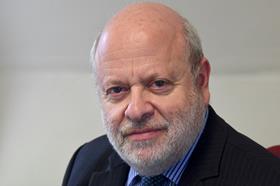I have taken to listening to Radio 3 rather than Radio 4. The news is so relentlessly distressing: war, earthquake, tedious political conflict at home, culture wars in the USA. I would rather listen to something approaching the eternal and beautiful.

The legal news is not much better: the UK’s administration of civil and criminal justice is collapsing, bills in parliament rattle our constitutional proprieties, there are dismaying cases before the Solicitors Disciplinary Tribunal, and in the USA a prominent lawyer has been jailed for the murder of his wife and son. So this week I prefer to look in the direction of the eternal and beautiful in legal affairs, too.
As it happens, I am appearing for the whole week in a production of William Shakespeare’s ‘The Tempest’. I play Gonzalo, the honest old counsellor to King Alonso of Naples. The court of Naples has been shipwrecked on Prospero’s island.
Gonzalo represents goodness and loyalty, and gives a relatively long speech about a perfect society. If you read academic analysis of ‘The Tempest’, one of its principal themes is the meaning of utopia.
As I say his lines nightly, I am struck by how many of his utopian wishes aim directly at the removal of lawyers and their work, despite the play being written over 400 years ago, when the role of a lawyer was presumably not as extensive as it is today.
He wants no judges or legal proceedings (‘no name of magistrate’).
Nor does he want the essentials of what make up the law – ‘Contract, succession, bourn, bound of land, tilth, vineyard — none’.
He does not cite all the essentials of the law, for instance 17th century notions of tort and crime, but that is doubtless because it is a poetic speech, not a documentary list of all possible categories. The inclusion of the other laws can be implied from the rest of the speech. For instance, riches and poverty are to be abolished, plus service of one person to another, and indeed all occupations must disappear. Instead ‘nature should bring forth of its own kind … all abundance to feed my innocent people.’ This will be a new golden age.
(An even more compelling reason why no other type of law appears is because Shakespeare copied the speech almost word for word from a 1603 translation of Montaigne's essay ‘Of Cannibals’, published in 1580, in which the Brazilian Indians are described as living at one with nature. What Montaigne mentioned, Shakespeare repeats almost without amendment.)
So can lawyers exist in a utopia? We are used to laughing at utopians, as do two of the Neapolitan court at everything Gonzalo says. Attempts at utopia in recent times, whether in Soviet Russia, Israeli kibbutzim or hippy communes – and I am not saying that those three are moral equivalents, or indeed equivalent in any respect other than their attempt to create an ideal society – have either failed or had to be severely modified to take account of human nature.
A lawyer’s idea of utopia would be one where lawyers and the law exist, to regulate the extreme consequences of human conduct and to moderate the impact of one human’s actions on another. A well-functioning legal system is part of a lawyer’s idea of utopia (or maybe I should just say, of this lawyer’s idea of utopia.)
In other words, lawyers can be utopians, indeed are necessarily so. At least a minimum of law, and a minimum of lawyers to administer the law, are needed to ensure that society works for everyone, and not just for the greedy and brutal.
There is a case for saying that there is too much law. Much of current political argument centres on the question of whether we are over-regulated (economically, for instance, from a right-wing perspective) or under-regulated (in terms of the power of the social media platforms, say). Those arguments are all about whether we would be a more perfect society in one direction or the other.
Fortunately, good Gonzalo’s crazy ideas have no widespread purchase. As the taunting members of the Neapolitan court point out, they contain a contradiction: he will personally implement these changes, even though he wants no authority in his ideal commonwealth, no sovereignty.
All perfect systems designed for human conduct must contain an internal contradiction, since human conduct can never be perfect. That is why law is the best possible solution, provided that it allows for a certain leeway for different opinions, permitting decisions to be made within a reasonable band. The only attainable utopia is one that does not iron out our differences.
Sometimes we should look up from our daily round within a failing welfare state (another utopia that is beginning to crumble), and spend time considering the eternal and beautiful, and how we should aim to construct a new version of it.
Jonathan Goldsmith is Law Society Council member for EU & International, chair of the Law Society’s Policy & Regulatory Affairs Committee and a member of its board. All views expressed are personal and are not made in his capacity as a Law Society Council member, nor on behalf of the Law Society































1 Reader's comment